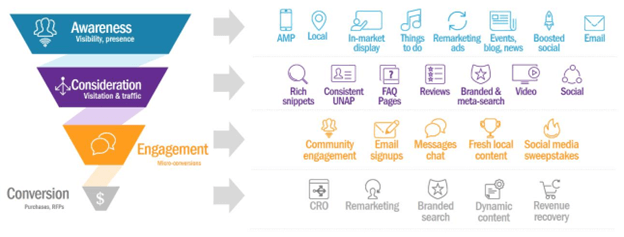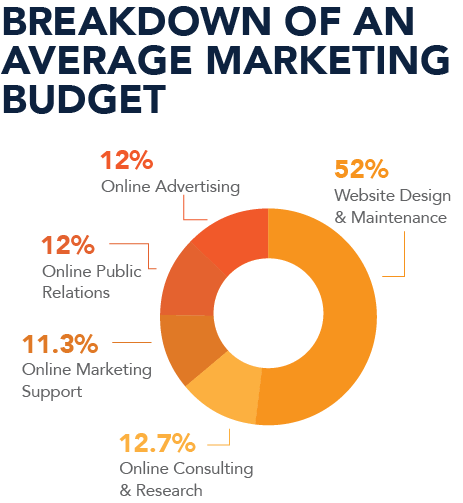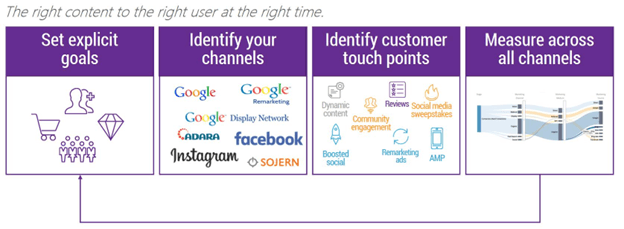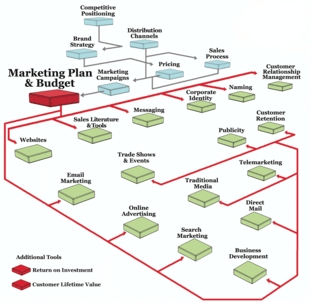SHARE

Digital marketing has become vital for businesses in today's fast-paced and tech-driven world. It allows businesses to reach their target audience more effectively and engage with them on various digital platforms.
However, to make the most of your digital marketing efforts, it is essential to have a well-defined and effective digital marketing budget in place. This article will explore the importance of a digital marketing budget and provide tips and strategies for creating one that suits your business needs.
Understanding The Importance of a Digital Marketing Budget
To fully grasp the significance of a digital marketing budget, it is essential to understand its role in business growth. A digital marketing budget is not just a set of numbers; it is a strategic allocation of resources that enables businesses to achieve their marketing goals.
It helps businesses prioritise their marketing efforts, measure return on investment (ROI), and make informed decisions about allocating resources to different digital marketing channels. Moreover, a well-structured digital marketing budget ensures that marketing initiatives are aligned with overall business objectives.
It allows businesses to allocate funds for campaigns, content creation, social media advertising, search engine optimisation (SEO), and other activities contributing to their marketing success. With a budget, businesses may find it easier to track their marketing expenses and measure the effectiveness of their strategies.
When it comes to digital marketing, having a budget is crucial for success. It provides businesses with a roadmap for marketing activities, allowing them to plan and execute strategies effectively. With a budget, businesses can allocate resources to various channels and tactics, ensuring they reach the right audience at the right time.
Furthermore, a digital marketing budget is vital in driving business growth. By investing in digital marketing initiatives, businesses can expand their reach and attract new customers. With the correct budget allocation, businesses can target specific demographics, optimise their campaigns, and generate leads that convert into loyal customers.
The Role of a Digital Marketing Budget In Business Growth
A digital marketing budget has a direct impact on your marketing strategy. It guides your decision-making process by providing a framework for allocating resources to different marketing channels and activities.
It helps you identify the most effective channels to reach your target audience, create engaging content, and measure the success of your campaigns. Moreover, a digital marketing budget promotes a proactive marketing approach. It encourages businesses to plan, set clear objectives, and define key performance indicators (KPIs) for measuring success.
Businesses can prioritise marketing activities, allocate funds strategically, and stay ahead of the competition by having a budget. With a well-defined digital marketing budget, businesses can experiment with new strategies and tactics.
They can allocate a portion of their budget to test innovative ideas, explore emerging platforms, and stay at the forefront of digital marketing trends. This allows businesses to continuously improve their marketing efforts and adapt to changing consumer preferences. By investing in a digital marketing budget, businesses can drive growth, engage with their target audience, and achieve their marketing goals.
Key Elements to Consider When Setting Your Digital Marketing Budget
When setting your digital marketing budget, a few key elements must be considered to ensure its effectiveness. These elements include setting marketing objectives, evaluating current digital marketing expenses, understanding your audience and their behaviour, and considering emerging trends in the digital marketing landscape.
Setting clear and achievable marketing objectives is the first step towards creating an effective digital marketing budget. Defining what you want to achieve through your digital marketing efforts is important.
Do you want to increase brand awareness, generate leads, drive website traffic, or improve customer engagement? Each objective requires a different set of strategies and resources, so it is essential to allocate funds accordingly.
Once you have defined your marketing objectives, it is time to evaluate your current digital marketing expenses. Analysing your previous marketing campaigns and assessing their performance will provide valuable insights. Identify areas where you are overspending or not getting the desired results. This evaluation will help you make
Steps To Create an Effective Digital Marketing Budget
Now that you understand the importance of a digital marketing budget and the key elements to consider when setting one, let's explore the steps involved in creating a practical budget.
Creating a digital marketing budget is crucial to any successful marketing strategy. It allows businesses to allocate resources effectively and maximise the impact of their digital marketing efforts. This guide will explore the steps to create an effective digital marketing budget.
Defining Your Marketing Goals
Defining your marketing goals is the first step in creating an effective digital marketing budget. What do you want to achieve through your digital marketing efforts? Do you want to increase brand awareness, generate leads, website traffic, or improve customer engagement? Setting clear and specific goals is essential as it directs your digital marketing activities.You can allocate funds and resources to the right marketing channels and tactics by understanding your objectives.
For example, if your goal is to increase brand awareness, you may allocate a significant portion of your budget to social media advertising and influencer marketing. On the other hand, if your objective is to generate leads, you may focus more on pay-per-click (PPC) advertising and content marketing.
Allocating Funds to Different Digital Marketing Channels
Once you have defined your goals, the next step is to allocate funds to different digital marketing channels. It is essential to consider the channels that align with your target audience and marketing objectives.
Allocate a percentage of your budget to channels such as social media advertising, pay-per-click (PPC), content marketing, search engine optimisation (SEO), email marketing, and influencer marketing. Each channel has its unique benefits and can contribute to different aspects of your marketing goals.
For instance, social media advertising can help increase brand awareness and engage with your target audience, while PPC advertising can drive immediate traffic to your website. Conversely, content marketing can establish your brand as a thought leader and generate organic traffic over time. Be flexible with your allocation and be prepared to adjust it based on the performance of different channels. Monitor the results of your campaigns, track return on investment (ROI), and reallocate funds accordingly to maximise the impact of your digital marketing efforts.
Monitoring and Adjusting Your Budget
Creating a digital marketing budget is not a one-time task. It requires constant monitoring and adjustment to ensure its effectiveness. Regularly review the performance of your campaigns, track key metrics, and make data-driven decisions to optimise your marketing budget. By monitoring the performance of your campaigns, you can identify areas that require improvement and make necessary adjustments. For example, if a particular channel is not delivering the desired results, you may consider reallocating funds to a more effective channel or optimising your campaign strategy.
Furthermore, tracking key metrics such as conversion rates, click-through rates, and cost per acquisition can provide valuable insights into the effectiveness of your budget allocation. By analysing this data, you can make informed decisions and allocate funds strategically to achieve better results.
Creating an effective digital marketing budget is a continuous process that requires careful planning, goal-setting, and monitoring. Optimise your digital marketing efforts and achieve your desired outcomes by defining your marketing goals, allocating funds to different channels, and regularly adjusting your budget based on performance.
Tips For Managing Your Digital Marketing Budget
Managing a digital marketing budget effectively is as important as creating one. Here are some tips to help you make the most of your budget:
Embracing Flexibility in Your Budgeting
Embrace flexibility in your budgeting approach to adapt to changing market trends, customer preferences, and the performance of your marketing initiatives. Be open to reallocating funds to different channels and activities based on their effectiveness and ROI.
The Importance of Regular Budget Reviews
Regularly review your marketing budget to identify areas for improvement and opportunities for optimisation. Analyse the performance of your campaigns, track key metrics, and make data-driven decisions to adjust your budget accordingly. This will help you maximise the impact of your marketing efforts.
Making Data-Driven Decisions in Budgeting
Base your budget decisions on data and analytics rather than intuition or assumptions. Use tools and platforms to track the performance of your campaigns, analyse customer behaviour, and measure ROI. This will help you make informed decisions about resource allocation and optimise your marketing budget.
Conclusion
In conclusion, creating a digital marketing budget is not merely an administrative task but a pivotal component of a successful and forward-thinking marketing strategy. This process demands meticulous planning and thoughtful contemplation to ensure that a business's resources are invested judiciously.
A well-structured budget is a guiding beacon, precisely illuminating the path towards achieving marketing objectives. Appreciating the paramount significance of a digital marketing budget is the first step towards harnessing its potential. In a world where the digital landscape constantly evolves, a budget provides much-needed stability and direction.
It enables businesses to make informed decisions, allocate resources effectively, and strategically prioritise marketing activities. By setting clear financial boundaries, organisations can avoid overspending, optimise their ROI, and ensure their marketing efforts are cost-effective.
The journey towards a comprehensive digital marketing budget involves considering all pertinent elements, such as goal alignment, target audience, market trends, and competition analysis. It is a well-thought-out exercise that considers the unique needs and circumstances of the business.
Furthermore, creating an effective budget should follow a systematic and data-driven approach. This includes identifying key performance indicators, regular monitoring and adaptation, and a commitment to staying flexible in the face of changing dynamics. Lastly, managing a digital marketing budget involves adopting proven tips and strategies, such as constant evaluation, technology integration, and strategic adjustments. By adhering to these principles, businesses can ensure that their digital marketing efforts remain agile, efficient, and results-driven.
A well-constructed digital marketing budget is the linchpin that holds a company's online presence together, ensuring that every marketing dollar spent is a step towards realising goals and maximising reach and impact in the digital realm. It is an investment in the future of the business, a testament to its adaptability and a testament to its commitment to thrive in the digital age.
Frequently Asked Questions About Digital Marketing Budgets
What Are Examples of Marketing Budget?
Marketing budgets can include various items depending on the company’s strategy and goals. Some examples include costs for advertising (online and offline), content creation and distribution, SEO, social media marketing, email marketing, events, public relations, and any tools or subscriptions used for executing marketing campaigns.
How Do You Structure a Marketing Budget?
A marketing budget is typically structured by allocating resources to various marketing channels and activities, often aligned with strategic goals. A portion may be devoted to digital marketing, traditional advertising, content production, and more, with sub-allocations for specific campaigns, tools, and resources. Ensure the budget aligns with your marketing goals and includes monitoring and adjustment plans for optimisation.
What Are the Three Marketing Budget Techniques?
- Percentage of Sales: Allocating a specific percentage of past or projected sales to the marketing budget.
- Objective and Task Method: Identifying the goals, determining the strategies/tasks to achieve them, and estimating the cost.
- Competitive Parity Method: Setting the budget comparable to competitor spending ensures competitive market visibility.
What Is a Basic Marketing Plan Budget?
A basic marketing plan budget outlines the anticipated costs of all marketing activities and channels planned for a specific period. It might involve allocations for various marketing channels like advertising, digital marketing, content creation, etc. The budget should be itemised and categorised, providing a clear view of planned spending against each activity or campaign and is usually guided by the company’s overall marketing objectives and expected returns.
Why Is a Marketing Budget Important?
A marketing budget is crucial to effectively manage and control spending on marketing activities, ensuring that investments are strategically allocated to yield the best possible ROI.
It allows businesses to be intentional with their resources, guiding where to invest to reach their objectives. Additionally, a marketing budget aids in evaluating the effectiveness of marketing activities by comparing the results against the planned investment, allowing for ongoing optimisation and strategy refinement.
Creating and managing a marketing budget involves strategic planning and ongoing management to ensure that investments are optimised and aligned with business goals.
Ensuring the budget is flexible and adaptable to market changes and business pivots is also crucial to maximise effectiveness.















